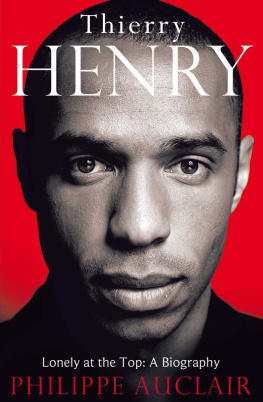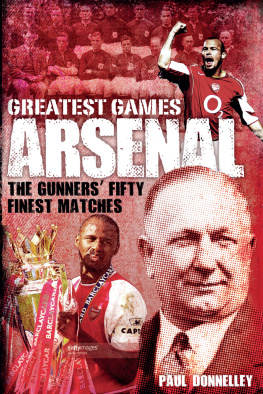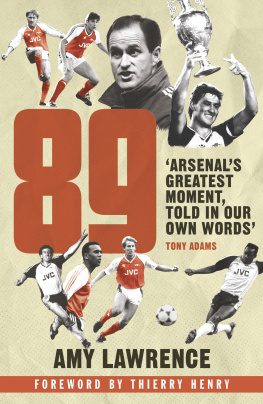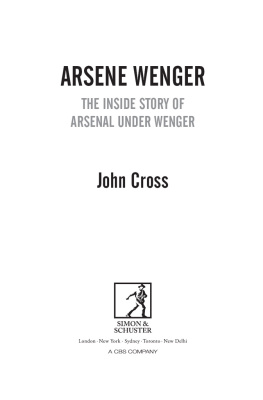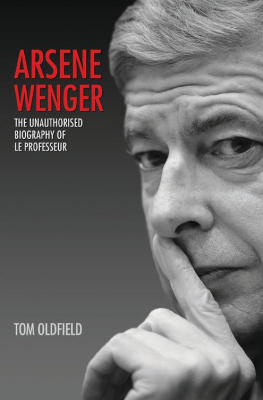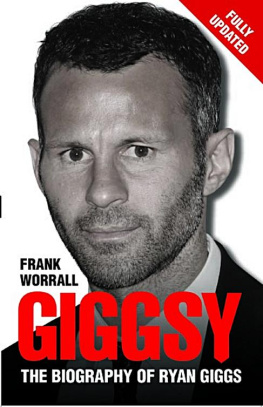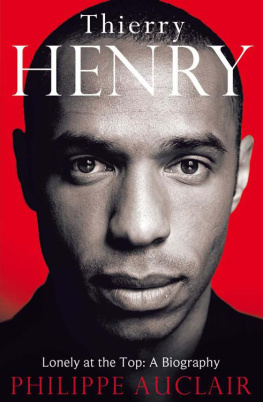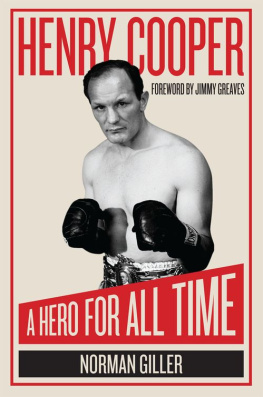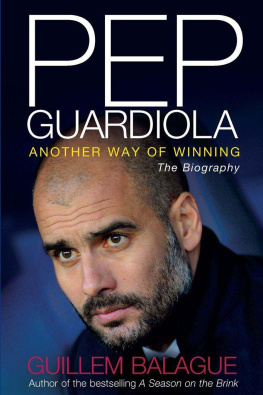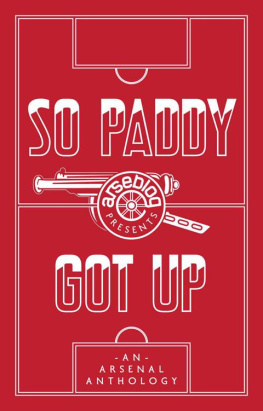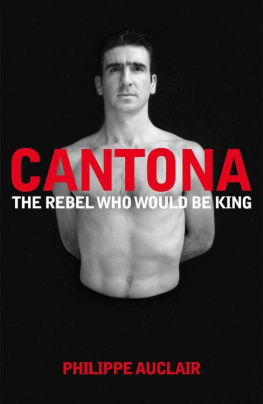
To Stewart, Nick and Amy
Ive been around the world
Had my pick of any girl
Youd think Id be happy
But Im not
Evrybody knows my name
But its just a crazy game
Oh, its lonely at the top
(Randy Newman, Lonely at the Top, 1970, 1975)
When you look at his record, the greatest striker ever. The Michael Jordan of football. He took the ball in the middle of the park, passed everybody and scored a goal when he wanted. The biggest talent ever, maybe, in football. He had everything you dream to have in a football player. Highly intelligent, analyses very quickly, great pace, great power, great jump. He only used 50 per cent of his jumping power. He could have been a tremendous header of the ball. He didnt fancy it too much. Still, he managed to be the best goalscorer ever [for Arsenal]. In the modern game, what he did is just... amazing.
(Arsne Wenger, 2007)
Preface

It was late in the summer of 2005. I was waiting for George Best, somewhat anxiously, in the office of his agent, Phil Hughes, just off the North End Road, a short walk away from the pubs where the 1968 European Footballer of the Year had spent the best part of the last twenty years downing pints of neat vodka and umpteen bottles of Pinot Grigio. Best was to be a guest of honour at my magazine France Footballs forthcoming celebration of the Ballon dOrs fiftieth anniversary. His own trophy had long been sold to a collector, and the cash raised by the sale frittered away on booze, birds and failed business ventures. My task was not to prise anecdotes from him, tragi-comic stories which hundreds of others had already been told and which were at some points in his life the only things he could sell to survive. On 2 December, I was to accompany the footballer whose photograph had been pinned above my boarding-school bed to Paris, where a replica of the golden ball would be presented to him in the presence of most of its other recipients. I had been granted the privilege of arranging the details of that trip.
The man who finally stepped out of the taxi (late, naturally) looked frail but still exuded the charm that had seduced so many, men and women alike. He was also chatty, witty, engaging in a way that came as a wonderful surprise to someone accustomed to the aloofness of todays star footballers. There was no way one could have known that the interview he granted me for free would be his very last. You may have seen some of the pictures we took that day: Best, unshaven, his greying hair unkempt, clad in a black leather jacket, his back resting against a rust-coloured brick wall. Theyre not easily forgotten.
A couple of weeks later, Bests exhausted body finally broke down, and a heart-rending death vigil began in front of of the Cromwell Hospital. George would never make it to Paris. The replica of his Ballon dOr was passed on to Manchester United FC instead, where it is now exhibited in the clubs museum. The engraved invitation I was to pass on to him lies unread in a sealed envelope, a mournful memento of the most poignant afternoon in my career as a journalist.
Thierry Henrys life followed a course that is so markedly different from George Bests that you might wonder why I choose to begin a book about Henry there, on that afternoon in West London. I do so because of what Best said as we were about to part: I dont recognize myself in the players I see today, he told me (Im quoting from memory, as my tape-machine had been switched off already). Theres only one who excites me, and that is Thierry Henry. Hes not just a great footballer, hes a showman, an entertainer.
These words have come back to me time and again over the past couple of years. It should have been easy to write about a footballer whom I had seen and spoken to regularly throughout his stay at Arsenal the club Ive supported since 1979 a footballer who had contributed so much to the Gunners and to my national team. But I found that the more I learnt about Henry, the more I talked to people who had known him far better than I had, the less I felt drawn to him in the way I had been drawn to George Best or Liam Brady. My awe at the scale of Henrys accomplishments hadnt waned, but I soon realized that I was falling out of love with the prodigious striker who had made me forget all press-box etiquette and leap out of my seat, screaming, when he scored that goal against Real Madrid at the Bernabu in 2006. What was happening was the exact opposite of what I had experienced whilst researching my biography of ric Cantona, when I had fallen under the spell of a player whose outbursts of violence and pompous pronouncements had often repelled me previously. It had been clear then that, despite his sulphurous reputation, which he had done everything in his power to cultivate, Cantona was ultimately a man who had been truly loved, and had been in his own bizarre, paradoxical and sometimes unjustifiable way worthy of being loved that much.
That much was clear: writing this book would be a much more arduous task than recounting rics life and career had been. In that case, I had started from the assumption (a modus operandi, if not an absolute truth) that a biographer should assume the role of an explorer whose duty was to question the maps that have been drawn before him. These maps profiles, interviews, essays, earlier biographies presented a tormented, even chaotic, landscape in Cantonas case, full of accidental breaks and faultlines placed there almost at random. It certainly made for an interesting journey.
But Thierry? If youll forgive the image, whilst previous accounts of rics life could be compared to a messy (but tasty) millefeuille of contradictory opinions, there was very little to bite into as far as Henry was concerned, even if his collated interviews ran to thousands of pages. Only one account of his career has been published so far, in 2005: Oliver Derbyshires optimistically subtitled Thierry Henry: The Amazing Life of the Greatest Footballer on Earth. In an age when footballers whove yet to reach their twenty-first birthday put their names to ghosted autobiographies, this absence of books about Henry struck me as very odd indeed and revelatory, too, of his puzzling image and status within the game. If he were indeed the greatest footballer on earth, why had no one bothered to scratch the veneer of the glossy picture he had presented to us for so long? And why were men who had routinely been described as his friends proving so reluctant to praise him unequivocally when I spoke to them? Why was there always an element of reserve in their appreciation?
I had fond memories of the man myself, but the further I delved into his past, the more these memories appeared to lose their relevance. Its not that I dug up previously unknown scandals in his quasi-perfect ascent to the top of his profession. Up to the infamous Hand of Gaul incident that might well, in the longer term, define him in the collective psyche far more than the titles and honours hes coveted and collected so assiduously Henrys career had been almost devoid of public controversy. I wrote the following piece shortly before France faced Ireland in Paris to decide which of these two teams would play in the 2010 World Cup:
Footballers often live on in the games folk history through the iconisation of a single moment in their careers, regardless of how much or how little that moment captures of their individual brilliance. Marco Tardelli is better remembered for his celebration of Italys second goal in the 1982 World Cup final than for the goal itself. ric Cantona will forever launch himself in the crowd at Selhurst Park, and Ferenc Puskas juggle the ball like a cheeky schoolboy in the centre circle of Wembley, whilst Diego Maradona punches the ball past Peter Shilton ad infinitum, his mesmerising run through the English defence almost reduced to a sideshow in that particular melodrama. Charlie George still lies on his back on the Highbury pitch. Pel has already offered the ball to Carlos Alberto and strolls on, casting a casual glance to his right: the slowness of his pace tells us more about his art, and his mastery of it, than any of the 1,281 goals he scored himself.
Next page
